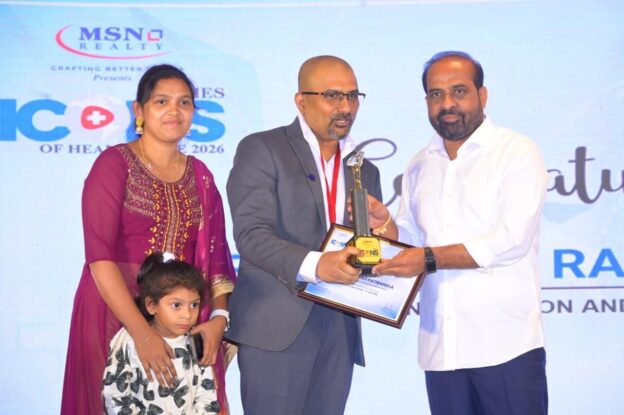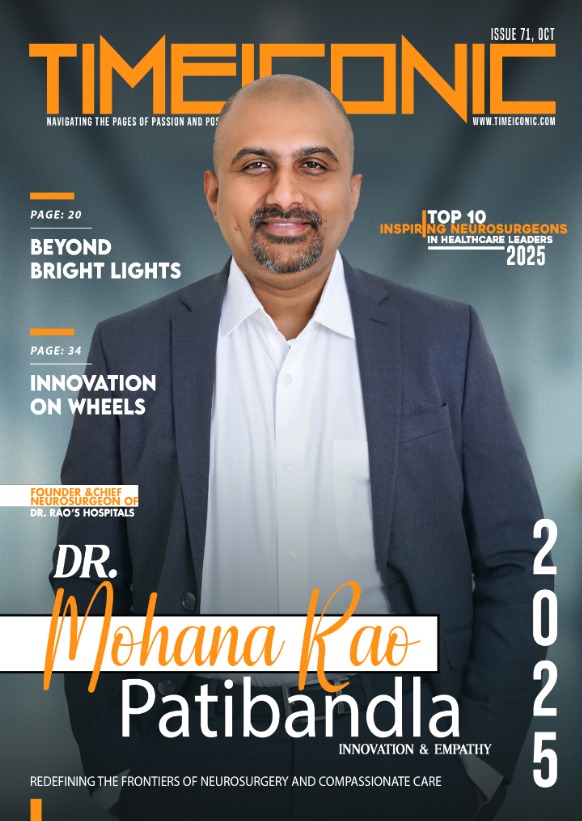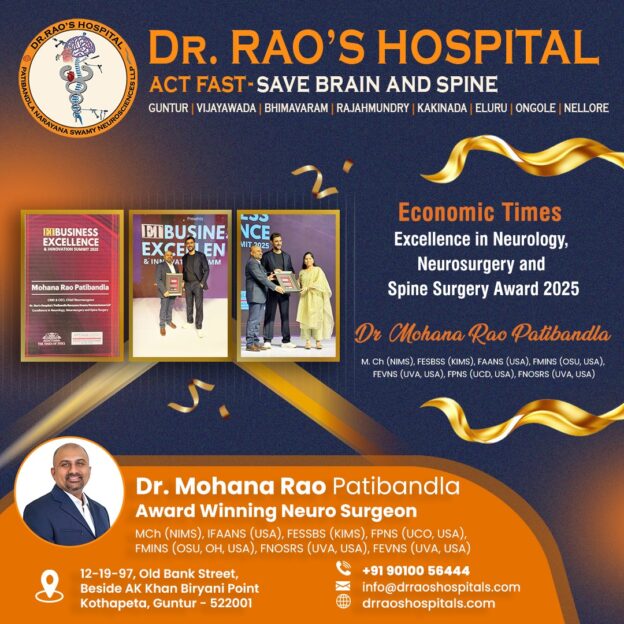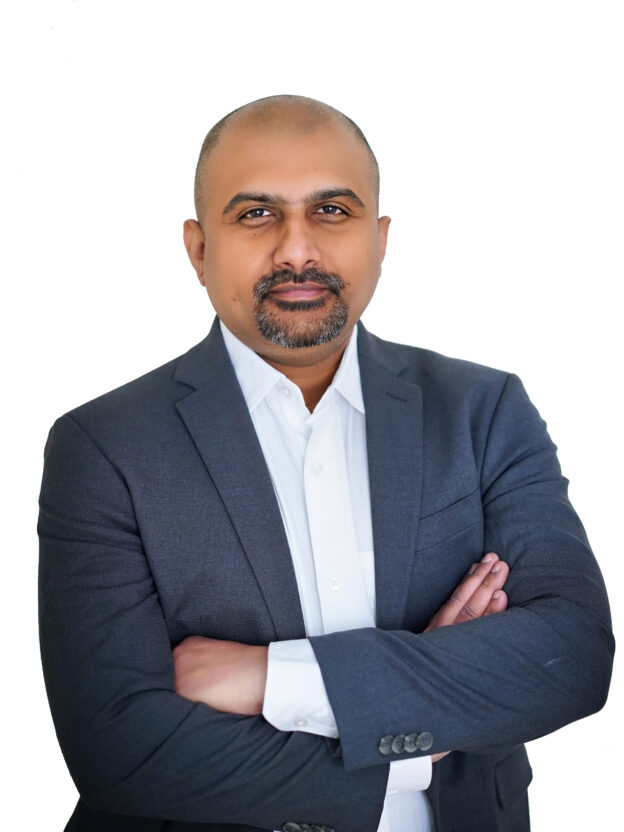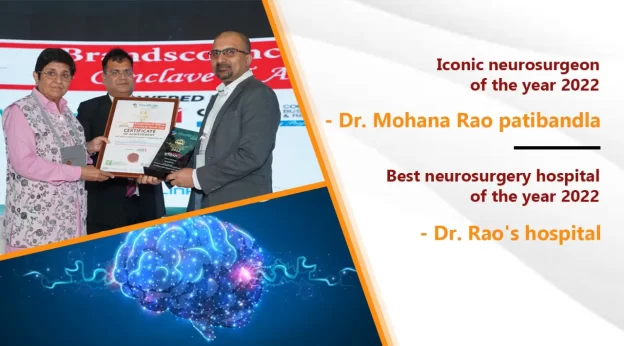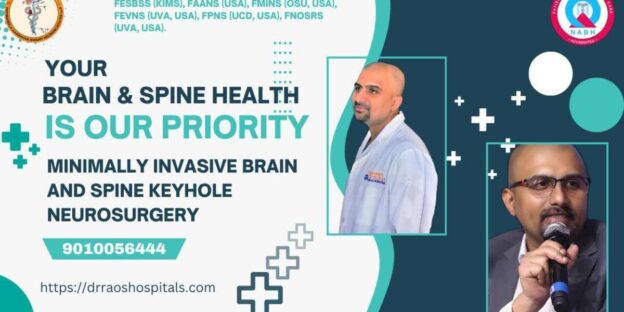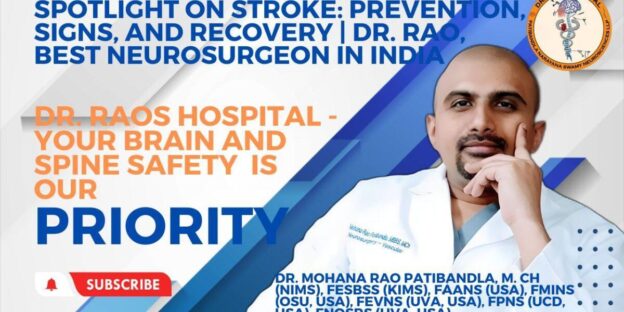Dr. Rao’s Hospital Wins Big at Times ICONs of Healthcare 2026: A Milestone for Advanced Neurosurgery in Andhra Pradesh
Introduction
In a proud moment for healthcare in Andhra Pradesh, Dr. Rao’s Hospital, Guntur, achieved national recognition at the Times ICONs of Healthcare 2026 awards. The prestigious event, organised by The Times of India, celebrated excellence in healthcare leadership, innovation, and patient outcomes.
At the ceremony held at Taj Vivanta, Vijayawada, two senior neurosurgeons from Dr. Rao’s Hospital were honoured, reinforcing the institution’s reputation as home to the best neurosurgeon in Guntur, the best neurologist in Guntur, and the best spine surgeon in Guntur.
Times ICONs of Healthcare 2026: Recognising Medical Excellence
The Times ICONs of Healthcare awards are among the most respected recognitions in India’s healthcare ecosystem. Institutions and clinicians are evaluated based on:
Clinical outcomes
Innovation and advanced techniques
Ethical medical practice
Patient-centric care
Contribution to regional and national healthcare
The Vijayawada edition of the 2026 awards highlighted Andhra Pradesh’s growing role as a hub for tertiary and quaternary medical care.
Triple Honour for Dr. Mohana Rao Patibandla
At the centre of this achievement was Dr. Mohana Rao Patibandla, Founder, Chairman, and Chief Neurosurgeon of Dr. Rao’s Hospital, who received three major state-level honours:
Best Neurosurgeon of Andhra Pradesh
Best Spine Surgeon of Andhra Pradesh
Best Endovascular Neurosurgeon of Andhra Pradesh
The awards were presented by Shri Satya Kumar Yadav, Hon’ble Minister for Health, Family Welfare, and Medical Education, Government of Andhra Pradesh.
This rare triple recognition reflects Dr. Rao’s leadership in complex brain surgery, advanced spine surgery, and endovascular neurosurgical procedures such as stroke intervention and cerebrovascular treatments.
Today, Dr. Mohana Rao Patibandla is widely regarded by patients and peers alike as the best neurosurgeon in Guntur, known for combining global expertise with compassionate, ethical care.
Best Neurosurgeon Award for Dr. Amit Kumar Thotakura
Adding to the celebrations, Dr. Amit Kumar Thotakura, Senior Consultant Neurosurgeon at Dr. Rao’s Hospital, was honoured with the Best Neurosurgeon Award at the same event.
Dr. Amit Kumar Thotakura has been recognised for his expertise in cranial and spinal neurosurgery, precision-driven surgical techniques, and consistent patient outcomes. His recognition further strengthens Dr. Rao’s Hospital’s position as a centre with a strong, team-based neurosurgical practice.
The recognition of two neurosurgeons from the same hospital at the Times ICONs of Healthcare 2026 highlights the depth of clinical excellence and mentorship culture within Dr. Rao’s Hospital.

Dr. Amit Kumar Thotakura receives the Times ICONs of Healthcare 2026 Best Neurosurgeon Award in Vijayawada.
Why This Recognition Matters for Patients
For patients and families, awards like the Times ICONs of Healthcare are more than accolades—they are indicators of trust, quality, and safety.
Being recognised at a state and national level reassures patients that they are receiving care from:
The best neurosurgeon in Guntur
A hospital known for advanced brain and spine care
Specialists trained in global best practices
A team focused on ethical, evidence-based medicine
This recognition also reinforces Dr. Rao’s Hospital’s role in reducing the need for patients to travel to metro cities for complex neurological treatments.
Dr. Rao’s Hospital: A Centre for Advanced Brain and Spine Care
Located in Guntur, Andhra Pradesh, Dr. Rao’s Hospital is a dedicated centre for neurology, neurosurgery, spine surgery, and endovascular care. The hospital is among the first independent, state-of-the-art neuroscience facilities in the region.
Patients seek care at Dr. Rao’s Hospital for conditions such as:
Brain tumors
Stroke and cerebrovascular disorders
Spine degeneration and complex spine disorders
Epilepsy and seizure disorders
Pediatric neurosurgical conditions
Endovascular neurosurgery
The hospital’s multidisciplinary approach, advanced infrastructure, and experienced team have made it a trusted destination for patients from across Andhra Pradesh, India, and abroad.
Best Neurologist, Best Spine Surgeon, Best Neurosurgeon in Guntur
Over the years, Dr. Rao’s Hospital has earned a reputation for excellence across the full spectrum of neurosciences. Patients frequently choose the hospital when searching for:
Best neurosurgeon in Guntur
Best neurologist in Guntur
Best spine surgeon in Guntur
The Times ICONs of Healthcare 2026 awards further validate this trust and reaffirm the hospital’s commitment to delivering world-class outcomes close to home.
A Vision for the Future
Speaking after the awards, Dr. Mohana Rao Patibandla emphasised that the recognition reflects teamwork and long-term vision rather than individual achievement alone. The hospital remains focused on:
Expanding minimally invasive neurosurgical techniques
Advancing endovascular stroke care
Improving access to high-quality neurological treatment
Maintaining ethical, patient-first medical practice
As Andhra Pradesh continues to strengthen its healthcare infrastructure, institutions like Dr. Rao’s Hospital play a key role in shaping the future of advanced medical care in the state.
టైమ్స్ ఐకాన్స్ ఆఫ్ హెల్త్కేర్ 2026లో డా. రావోస్ హాస్పిటల్ ఘన విజయం: ఆంధ్రప్రదేశ్లో న్యూరోసర్జరీకి మైలురాయి
పరిచయం
ఆంధ్రప్రదేశ్ వైద్య రంగానికి గర్వకారణంగా నిలిచే ఘట్టంగా, డా. రావోస్ హాస్పిటల్, గుంటూరు ప్రతిష్టాత్మక టైమ్స్ ఐకాన్స్ ఆఫ్ హెల్త్కేర్ 2026 అవార్డ్స్లో విశేష గౌరవాన్ని అందుకుంది.
ది టైమ్స్ ఆఫ్ ఇండియా ఆధ్వర్యంలో నిర్వహించిన ఈ కార్యక్రమం, వైద్య రంగంలో ఉత్తమత, నవీనత మరియు రోగి కేంద్రిత సేవలను గుర్తించేందుకు ఉద్దేశించబడింది.
విజయవాడ – తాజ్ వివాంటాలో నిర్వహించిన ఈ వేడుకలో, డా. రావోస్ హాస్పిటల్కు చెందిన ఇద్దరు ప్రముఖ న్యూరోసర్జన్లు జాతీయ స్థాయిలో సత్కరించబడ్డారు. ఇది గుంటూరులో ఉత్తమ న్యూరోసర్జన్, ఉత్తమ న్యూరాలజిస్ట్, ఉత్తమ స్పైన్ సర్జన్గా డా. రావోస్ హాస్పిటల్కు ఉన్న విశ్వసనీయతను మరింత బలపరిచింది.
Neurosurgery & Neurology
న్యూరోసర్జరీ విభాగం:
https://drraoshospitals.com/neurosurgery/న్యూరాలజీ విభాగం:
https://drraoshospitals.com/neurology/బ్రెయిన్ ట్యూమర్ చికిత్స:
https://drraoshospitals.com/brain-tumor-treatment/ఎపిలెప్సీ (ఫిట్స్) చికిత్స:
https://drraoshospitals.com/epilepsy-treatment/
టైమ్స్ ఐకాన్స్ ఆఫ్ హెల్త్కేర్ 2026: వైద్య ఉత్తమతకు గుర్తింపు
టైమ్స్ ఐకాన్స్ ఆఫ్ హెల్త్కేర్ అవార్డులు భారతదేశంలో అత్యంత ప్రతిష్టాత్మకమైన వైద్య గౌరవాలలో ఒకటి. ఈ అవార్డులు కింది ప్రమాణాల ఆధారంగా నిర్ణయించబడతాయి:
చికిత్స ఫలితాలు (Clinical Outcomes)
ఆధునిక వైద్య సాంకేతికతల వినియోగం
నైతిక వైద్య విధానం
రోగి కేంద్రిత సేవలు
సమాజానికి చేసిన సేవ
2026 విజయవాడ ఎడిషన్, ఆంధ్రప్రదేశ్ను అధునాతన వైద్య సేవల కేంద్రంగా అభివృద్ధి చెందుతున్న రాష్ట్రంగా మరింత ముందుకు తెచ్చింది.
Spine & Endovascular Care
స్పైన్ సర్జరీ విభాగం:
https://drraoshospitals.com/spine-surgery/మినిమల్ ఇన్వేసివ్ స్పైన్ సర్జరీ:
https://drraoshospitals.com/minimally-invasive-spine-surgery/స్ట్రోక్ & ఎండోవాస్కులర్ చికిత్స:
https://drraoshospitals.com/stroke-treatment/
డా. మోహన రావు పాటిబండ్లకు మూడు రాష్ట్రస్థాయి అవార్డులు
ఈ ఘనతలో ప్రధాన ఆకర్షణగా నిలిచింది డా. మోహన రావు పాటిబండ్ల, డా. రావోస్ హాస్పిటల్ వ్యవస్థాపకులు, చైర్మన్ మరియు చీఫ్ న్యూరోసర్జన్. ఆయనకు ఒకేసారి మూడు ప్రధాన అవార్డులు లభించాయి:
ఆంధ్రప్రదేశ్ ఉత్తమ న్యూరోసర్జన్
ఆంధ్రప్రదేశ్ ఉత్తమ స్పైన్ సర్జన్
ఆంధ్రప్రదేశ్ ఉత్తమ ఎండోవాస్కులర్ న్యూరోసర్జన్
ఈ అవార్డులను ఆంధ్రప్రదేశ్ ఆరోగ్య, కుటుంబ సంక్షేమం మరియు వైద్య విద్యా శాఖ మంత్రి శ్రీ సత్య కుమార్ యాదవ్ గారు ప్రదానం చేశారు.
ఈ అరుదైన త్రిపుల్ గౌరవం, డా. మోహన రావు పాటిబండ్ల గారి సేవలను స్పష్టంగా ప్రతిబింబిస్తుంది. బ్రెయిన్ సర్జరీ, క్లిష్టమైన స్పైన్ సర్జరీలు, స్ట్రోక్ చికిత్సలు మరియు ఎండోవాస్కులర్ న్యూరోసర్జరీ రంగాల్లో ఆయన చేసిన కృషి వల్ల నేడు గుంటూరులోనే ప్రపంచ స్థాయి చికిత్సలు అందుబాటులోకి వచ్చాయి.
నేడు అనేక మంది రోగులు ఆయనను గుంటూరులో ఉత్తమ న్యూరోసర్జన్గా విశ్వసిస్తున్నారు.
Doctors & Appointments
డా. మోహన రావు పాటిబండ్ల ప్రొఫైల్:
https://drraoshospitals.com/dr-mohana-rao-patibandla/డాక్టర్ల బృందం:
https://drraoshospitals.com/our-doctors/అపాయింట్మెంట్ బుక్ చేయండి:
https://drraoshospitals.com/book-appointment/
డా. అమిత్ కుమార్ థోటకూరకు ‘ఉత్తమ న్యూరోసర్జన్’ అవార్డు
డా. రావోస్ హాస్పిటల్కు మరొక గర్వకారణంగా, సీనియర్ కన్సల్టెంట్ న్యూరోసర్జన్ అయిన డా. అమిత్ కుమార్ థోటకూర గారికి కూడా ఉత్తమ న్యూరోసర్జన్ అవార్డు లభించింది.
క్రానియల్ మరియు స్పైనల్ న్యూరోసర్జరీలో ఆయన నైపుణ్యం, శస్త్రచికిత్సల్లో ఖచ్చితత్వం, రోగుల పట్ల చూపించే అంకితభావం ఈ గౌరవానికి కారణం.
ఒకే హాస్పిటల్కు చెందిన ఇద్దరు న్యూరోసర్జన్లు ఒకే వేడుకలో సత్కరించబడటం, డా. రావోస్ హాస్పిటల్లో ఉన్న బలమైన వైద్య బృందం మరియు మార్గదర్శకత్వాన్ని స్పష్టంగా చూపిస్తుంది.
రోగులకు ఈ గుర్తింపు ఎందుకు ముఖ్యము?
రోగులు మరియు వారి కుటుంబాలకు, ఇలాంటి అవార్డులు కేవలం ప్రశంసలే కాదు —
వీటి ద్వారా నమ్మకం, భద్రత, నాణ్యత స్పష్టంగా తెలుస్తాయి.
టైమ్స్ ఐకాన్స్ ఆఫ్ హెల్త్కేర్ వంటి గుర్తింపు అంటే:
గుంటూరులో ఉత్తమ న్యూరోసర్జన్ సేవలు
ఆధునిక బ్రెయిన్ & స్పైన్ చికిత్సలు
మెట్రో నగరాలకు వెళ్లాల్సిన అవసరం లేకుండా చికిత్స
నైతిక, శాస్త్రీయ ఆధారిత వైద్యం
డా. రావోస్ హాస్పిటల్: బ్రెయిన్ & స్పైన్ చికిత్సలో ప్రత్యేక కేంద్రం
గుంటూరు, ఆంధ్రప్రదేశ్లో ఉన్న డా. రావోస్ హాస్పిటల్, న్యూరాలజీ, న్యూరోసర్జరీ, స్పైన్ సర్జరీ మరియు ఎండోవాస్కులర్ చికిత్సలకు పూర్తిగా అంకితమైన ప్రత్యేక కేంద్రం.
ఇక్కడ చికిత్స పొందే ముఖ్య సమస్యలు:
బ్రెయిన్ ట్యూమర్లు
స్ట్రోక్ మరియు మెదడు రక్తనాళ సమస్యలు
వెన్నెముక వ్యాధులు
ఎపిలెప్సీ (Fits)
పిల్లల న్యూరోసర్జరీ సమస్యలు
ఆంధ్రప్రదేశ్తో పాటు దేశ విదేశాల నుంచి కూడా రోగులు ఇక్కడికి వస్తున్నారు.
గుంటూరులో ఉత్తమ న్యూరోసర్జన్ | ఉత్తమ న్యూరాలజిస్ట్ | ఉత్తమ స్పైన్ సర్జన్
కాలక్రమంలో డా. రావోస్ హాస్పిటల్కు లభించిన నమ్మకం వల్ల, రోగులు తరచుగా ఈ విధంగా వెతుకుతున్నారు:
గుంటూరులో ఉత్తమ న్యూరోసర్జన్
గుంటూరులో ఉత్తమ న్యూరాలజిస్ట్
గుంటూరులో ఉత్తమ స్పైన్ సర్జన్
టైమ్స్ ఐకాన్స్ ఆఫ్ హెల్త్కేర్ 2026 అవార్డులు ఈ విశ్వసనీయతకు మరింత ముద్ర వేశాయి.
భవిష్యత్తుపై దృష్టి
ఈ అవార్డులు వ్యక్తిగత గౌరవం కంటే, బృంద కృషికి గుర్తింపని డా. మోహన రావు పాటిబండ్ల గారు పేర్కొన్నారు. భవిష్యత్తులో డా. రావోస్ హాస్పిటల్ లక్ష్యాలు:
మినిమల్ ఇన్వేసివ్ న్యూరోసర్జరీ విస్తరణ
అధునాతన స్ట్రోక్ చికిత్సలు
అందరికీ అందుబాటులో ఉన్న నాణ్యమైన వైద్యం
రోగి కేంద్రిత వైద్య విధానం
Hospital Information
డా. రావోస్ హాస్పిటల్ గురించి:
https://drraoshospitals.com/about-us/రోగుల టెస్టిమోనియల్స్:
https://drraoshospitals.com/patient-testimonials/- అపాయింట్మెంట్ బుక్ చేయండి:
https://drraoshospitals.com/book-appointment/
ముగింపు
టైమ్స్ ఐకాన్స్ ఆఫ్ హెల్త్కేర్ 2026లో లభించిన బహుళ అవార్డులు, డా. రావోస్ హాస్పిటల్ ప్రయాణంలో ఒక కీలక మైలురాయిగా నిలిచాయి.
ఆంధ్రప్రదేశ్లో బ్రెయిన్ మరియు స్పైన్ చికిత్సలకు డా. రావోస్ హాస్పిటల్ ఒక నమ్మకమైన చిరునామాగా నిలుస్తోంది.
సంప్రదించండి
మీకు లేదా మీ కుటుంబ సభ్యులకు గుంటూరులో ఉత్తమ న్యూరోసర్జన్,
ఉత్తమ న్యూరాలజిస్ట్,
ఉత్తమ స్పైన్ సర్జన్ అవసరమైతే, డా. రావోస్ హాస్పిటల్ను సంప్రదించండి.
🌐 వెబ్సైట్: https://drraoshospitals.com
📧 ఇమెయిల్: info@drraoshospitals.com
📍 స్థలం: గుంటూరు, ఆంధ్రప్రదేశ్
Conclusion
The multiple honours received at the Times ICONs of Healthcare 2026 mark a significant milestone for Dr. Rao’s Hospital and for neuroscience care in Andhra Pradesh. With national recognition for its leadership, expertise, and patient outcomes, the hospital continues to set benchmarks in brain and spine care.
For patients seeking trusted, advanced neurological treatment, Dr. Rao’s Hospital stands as a symbol of excellence, innovation, and compassionate care.
Call to Action
If you or your loved ones are looking for the best neurosurgeon in Guntur, the best neurologist in Guntur, or the best spine surgeon in Guntur, consult the expert team at Dr. Rao’s Hospital.
🌐 Website: https://drraoshospitals.com
📧 Email: info@drraoshospitals.com
📍 Location: Guntur, Andhra Pradesh

